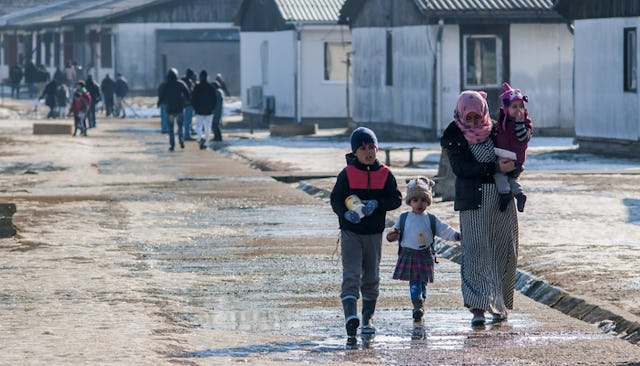What If It Were My Baby? The Importance Of Putting Ourselves In Another Mother's Shoes

It’s been two years, and I still can’t shake the image of his tiny body lying face down on the shore. I avoided the photo at first, not wanting to be a voyeur of someone else’s tragedy. I thought hearing the story itself was enough.
It wasn’t until I saw the correction of his name in a headline — not Aylan, but Alan Kurdi — that I decided to swallow my own sadness and look at the image with both eyes open. I looked because Alan had a mother who had lovingly, purposefully named him, just like I had lovingly and purposefully named my little boy. I looked because while I was sitting in my living room watching my children play, Alan’s mother had drowned in a futile attempt to get him to safety.
I didn’t just look at the photo. I sat with it, held space for it, gave it the thoughtful reverence it deserved. It was clear that Alan had recently had a haircut. I wondered if he’d squirmed or sat still. He was wearing shoes. I imagined his mother helping him put them on and wondered if, like every other 3-year-old in the world, he had insisted on doing it himself.
I stared at his lifeless body, transforming his dark features into my son’s fair skin and blonde hair. And I asked myself the question every other mother who saw that photo asked:
What if it were my baby?
It’s too much for any mother to think about. But I do think about it, every time I see stories of families fleeing war-torn countries. I think about it when I read about a mother digging through the rubble to see if her baby survived a midnight bombing. I think about it every time I see the photos and videos of children whose faces bear the expressionless sign of shock and trauma overload. I think about it every time I hear about any atrocity or disaster in the world.
What if it were my baby?
Most of us in America have no way of understanding what it would be like to live in a city under siege. Most of us can’t picture the skyline of our city or town — its businesses, banks, coffee shops, libraries — leveled to the ground. Most of us can’t fathom the profound insecurity that comes from watching your country burn and not knowing whom to call. Most of us can’t imagine what it’s like to put your children in an inflatable boat on the sea, knowing it might sink, because it’s the safest option you have.
What if it were my baby?
How do these mothers cope emotionally? I know how much it hurts my heart to see my children sad or scared. And they count on me as a voice of reason and strength to help them overcome their fears and sadness. But what if we were in a situation where I was just as sad and scared as they were? What if I were actually more sad and scared because I fully understood what was at stake and what could possibly happen? How do you mother in that situation? How do you find courage and fortitude to pass onto your children? How do you give them a sense of security when there is no security to be found?
What if it were my baby?
I think about what I would do keep my children safe. What would I give up? What would I risk? What would I be willing to do or say or endure to give my children a chance to live their lives away from constant danger and fear?
I don’t know the answer. None of us does until those questions are staring us in the face.
So I shake them off and instead think about what I can do for these mothers. If I were in their shoes, what would I want?
I would want people to understand my fear. I would want people to care. I would want whatever help they could offer so that I could pass along a sense of hope and security to my children.
I would want to be able to say to my kids, “See? This is humanity. The violence and bloodshed and horror you’ve seen and experienced is not the way it’s supposed to be. These people who are reaching out and inviting us in are what human beings do when other human beings are suffering and need a safe place to go. This is what loving your neighbor looks like.”
We moms who live in stable countries with public services and infrastructure and community help and social networks should be the first in line to extend a hand to those whose countries’ infrastructure, services, communities, and networks have been turned upside down or leveled to the ground by war and conflict.
When I put myself in the shoes of mothers facing dire circumstances and impossible choices, my heart breaks in two. With every image of a suffering or scared child, with every story of a family desperately seeking safety, the question echoes from one mother’s heart to another.
What if it were my baby?
What if it were yours?